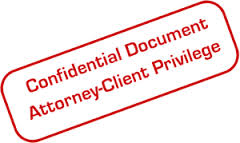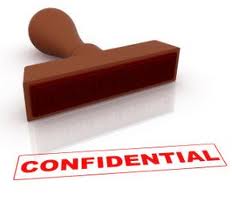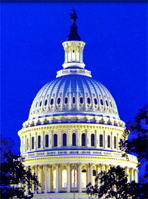Preserving The Attorney-Client Privilege For In-House Counsel
By admin on February 12, 2014
 Courts impose on corporate entities the burden of demonstrating that communications and documents shared with in-house counsel are protected by the attorney-client privilege. When companies cannot satisfy this burden, courts have ordered production of emails involving legal counsel, compliance logs and internal audits. As a result of these court orders, companies have been forced to produce, often to their detriment in litigation, confidential attorney-client communications.
Courts impose on corporate entities the burden of demonstrating that communications and documents shared with in-house counsel are protected by the attorney-client privilege. When companies cannot satisfy this burden, courts have ordered production of emails involving legal counsel, compliance logs and internal audits. As a result of these court orders, companies have been forced to produce, often to their detriment in litigation, confidential attorney-client communications.
Courts examine evidence submitted in support of a privilege assertion rigorously. If there is any indication that an overly broad privilege is being asserted or that there is some perceived abuse of the privilege to protect “business” documents, disclosure will likely be required. As will be discussed, Merck was required to go to extraordinary lengths to protect the privilege some years ago in the Vioxx MDL.
In an article titled, “Preserving the Attorney-Client Privilege for In-House Counsel,” published in AHLA Connections (December 2013), Thomas E. Zeno and Emily E. Root of Squire Sanders, provide practical advice for in-house counsel and their clients to increase the likelihood of preserving the privilege.
The authors’ tips may be summarized as follows:
1. Clients should make a clear request for legal advice. Although an email that begins, “Joe, I’d like your legal advice on the following situation…” may sound stilted or overly formal, this communication signals to a reviewing court that the client is requesting legal advice.
In-house counsel should provide a clear link between their legal advice and its legal justification.
For example, if it is the company’s argument that the primary purpose of a communication was to obtain legal advice, the assertion of the privilege will be strengthened if the in-house lawyer’s revision to draft advertising is accompanied by a statement such as “To comply with FDA rules…”.
2. Avoid sending mixed purpose emails. If in-house counsel is providing both non-privileged business advice on a particular transaction and legal advice, the two should be kept separate. Some courts have taken the position that corporations that choose to communicate with legal and non-legal staff simultaneously should recognize that the privilege may not attach to such mixed purpose communications.
3. The company should give consideration to email formatting. If an employee sending an email to in-house counsel is seeking legal advice, it is not helpful if multiple non-lawyer recipients are listed in the “To” field. If non-lawyers are receiving a copy of a request for legal advice so that they know that the request was made, only the lawyers should be listed in the “To” field. Although this may seem like a minor point, these issues can take on a life of their own during heated motion practice before a federal magistrate judge.
4. Courts reviewing privilege claims often review the job descriptions for the staffers involved. For non-legal employees, it may be helpful to provide a discussion in the job description about what kind of legal information or advice they may have to be kept apprised of to avoid the claim that the non-legal employee’s receipt of legal advice was not necessary. In the case of counsel, the job description should clearly define the attorney’s business-related functions.
5. In-house counsel’s advice should not be broadly disseminated. Management should provide a separate communication to company employees to put into effect the operational changes recommended by counsel rather than circulate the lawyer’s work product.
separate communication to company employees to put into effect the operational changes recommended by counsel rather than circulate the lawyer’s work product.
The most important observation made by Zeno and Root is that courts’ different treatment of in-house counsel stems largely from their multiple roles within their organizations, not all of which involve the rendering of legal advice.
They write, in pertinent part:
Across the health care industry, health systems, physician groups, and pharmaceutical, medical device, and life sciences companies are adopting new approaches to risk management. In response to pressures like self-disclosure obligations and the specter of False Claims Act investigations, legal personnel are becoming more integrated into these organizations. Increasingly, lawyers are involved in and advising on day-to-day operations much more than five or ten years ago.
Health care organizations also are facing tightening budgets, and many are trying to control costs by having in-house counsel handle matters that previously would have been referred to outside counsel. These multiple roles exact a cost on the privilege. When organizations assert the attorney-client privilege over communications with lawyers acting in these expanded roles, they seek to shield documents and communications that generally have been available to the government through subpoena or to civil litigants through discovery.
Issues of privilege were the subject of prolonged and heated discovery proceedings in In re Vioxx Prod. Liability Litig., MDL No. 1657, which was litigated in the United States District Court for the Eastern District of Louisiana during the mid-2000’s.
In that matter, the court expressed the concern that businesses would seek to immunize internal communications from discovery by placing legal counsel in strategic corporate positions and funneling documents through counsel and thereby defeating plaintiffs’ legitimate discovery needs. In the Vioxx MDL, Judge Fallon bemoaned that “this discovery dispute has dragged on for over a year and, at times, has seemed hopelessly endless. Although Merck has produced over two million documents in this MDL, the company has also asserted attorney-client privilege as to approximately 30,000 documents which it contends need not be produced.”
Merck argued that because the drug industry is so extensively regulated by the FDA, virtually everything a member of the industry does carries potential legal ramifications vis-à-vis government regulators. The MDL court appreciated how certain functions performed by counsel, such as commenting upon editing television ads and other promotional materials could, in fact, be legal advice within the context of the drug industry. Despite this understanding, the MDL court was not willing to concede that all of the documents Merck had labeled privileged should be afforded protection.
As reflected in the court’s ruling, some of Merck’s privilege assertions met with more success than others. For example, under its “pervasive regulation” theory, Merck convincingly argued that the breadth and scope of FDA regulation made broad legal involvement in business operations a necessity.
However, Merck met with less success in making its “collaborative effort” theory. In arguing “collaborative effort”, Merck contended that emails addressed to multiple legal and non-legal people within the company were attorney-client protected despite a distribution pattern that indicated that these communications serve both legal and non-legal purposes.
The “collaborative effort” argument did not succeed because the court recognized that in every company all corporate departments are part of a “collaborative effort.” According to the court,
“To say that wide dissemination to non-lawyers within a company for their technical input is primarily legal makes no more sense than saying that communicating with in-house counsel is primarily scientific because scientific validity is at the heart of FDA regulations and, as a consequence, of what lawyers must be concerned about in public statements, advertisements and labels.”
More broadly, if the courts were to accept the “collaborative effort” argument, the MDL court believed that it would effectively immunize from discovery all such internal communications within the drug industry and preclude plaintiffs from discovering communications potentially vital to their claims of knowledge, failure to warn and intentional misrepresentation.
In-house lawyers are likely to become increasingly entwined within the fabric of their clients’ business. At the same time, it is clear that the in-house attorney-client privilege is under attack. Although there is no fool-proof method of protecting the privilege, Zeno and Root’s article offers valuable guidance if a contested privilege issue is submitted to the court for resolution.

 On June 25, 2012, the California Supreme Court issued its long-awaited decision in
On June 25, 2012, the California Supreme Court issued its long-awaited decision in  This decision may certainly have an impact on litigation strategy in California. The decision whether to require a party to turn over witness statements obtained by counsel, or disclose the identities of persons who provided statements, will generally be left to the discretion of the judge. Some judges may be more inclined to require the production of this information than others. In employment litigation, for example, there is concern in the defense bar that "employee-leaning" judges will automatically order disclosure of statements obtained by the employer’s counsel.
This decision may certainly have an impact on litigation strategy in California. The decision whether to require a party to turn over witness statements obtained by counsel, or disclose the identities of persons who provided statements, will generally be left to the discretion of the judge. Some judges may be more inclined to require the production of this information than others. In employment litigation, for example, there is concern in the defense bar that "employee-leaning" judges will automatically order disclosure of statements obtained by the employer’s counsel. Justice Sotomayor stated:
Justice Sotomayor stated: On September 19, 2008, President Bush signed S. 2450 into law and new
On September 19, 2008, President Bush signed S. 2450 into law and new